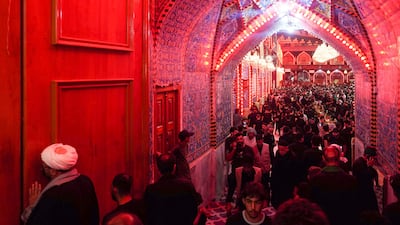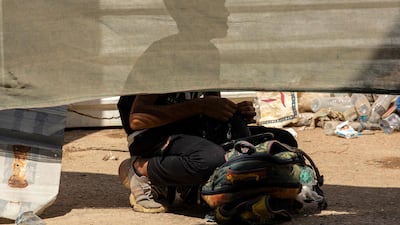Hundreds of thousands of black-clad Shiite Muslim pilgrims thronged to Iraq’s revered shrine city of Karbala on Tuesday to observe a major religious event amid tight security measures.
The annual pilgrimage, known as Arbaeen, marks the end of a 40-day mourning period for the killing of the 7th century grandson of the Prophet Mohammed, Imam Hussein, along with his family members and loyalists.
At the time, Imam Hussein had revolted against the Damascus-based second Umayyad caliph, Yazid bin Muawiyah, moving from Madinah to outside Karbala in modern day Iraq, where a battle took place.
Surviving family members were then taken to Damascus as prisoners.
Arbaeen occurs forty days after the day of Ashoura, when Imam Hussein was killed. It marks the return of his family to Karbala from Damascus, to bid farewell and grieve for their loved ones while on their way to Madinah.
Sitting cross-legged inside the ornately decorated plaza that surrounds the tomb, worshippers wept and beat their chests in grief as a sheikh on a podium recited the story of the return, with elegies.
Those inside scrambled to touch Imam Hussein’s sarcophagus, which is encased in engraved gold and silver. Those who reached the silver protective bar held it tight, recited prayers and broke down in tears.
Outside, different factions of Iraqi security forces, including the government-sanctioned Popular Mobilisation Forces, an umbrella group that is made up mainly of pro-Iran Shiite militias, closed off all roads leading to Karbala to protect the pilgrims. Military helicopters hovered overhead.
Sunni extremist militants often attack Shiites during their religious festivals, viewing them as heretics. But attacks have become rare over the years after the successive defeats of Al Qaeda in Iraq and later, ISIS. No attacks were reported this year.
“Thank God, the pilgrimage was wonderful and everything went well,” Iranian pilgrim Khadiga Ismael told The National over the phone from Karbala.
Ms Ismael, 50, arrived Karbala on Tuesday morning after crossing the Shalamcha border crossing in Basra. She's from Bushehr province in southern Iran and is travelling with her two daughters, two grandsons and a son-in-law.
“This is the first time to do Arbaeen pilgrimage. I feel energetic and not feeling at all tired despite my diabetes and other health problems, thanks to Imam Hussein's blessings,” she said.
“I prayed for my family as well as Iraq and Iraqis to live in peace and security,” she added.
The event usually draws millions of pilgrims from around the world to visit the gold-domed shrines of Imam Hussein and his brother Imam Abbas.
The main ritual for the event is the traditional long-walk to Karbala from different areas inside and outside of Iraq to show support for Imam Hussein’s family, who walked from Damascus to Karbala.
Volunteers set up tents along the roads to distribute free food and drinks and offer places for pilgrims to relax.
The story of Imam Hussein is deeply ingrained in the Shiite consciousness. For them, it is a story of a revolution against tyranny and the sacrifice of an extraordinary, revered figure for the sake of reform.
The event “embodies the most beautiful noble human principles of reform and peace and rejects injustice and tyranny, to live with dignity,” Iraqi President Barham Salih said during his speech at the UN General Assembly meeting in New York this month.
“Our people are determined to protect the country and to continue moving on the path of reform and fighting corruption and protecting the right to live a dignified life,” Mr Salih added.
The country’s Prime Minister, Mustafa Al Kadhimi, said of the commemoration: “The revolution of Imam Hussein is one of the most prominent historic examples of protest against human rights violations.”
“We are reminded today that confronting such violations is never an easy task, and requires more than good intentions,” Mr Al Kadhimi added — obliquely referencing the current national youth protest movement, which he claims to support.
Such gatherings have been a challenge to Iraqi health authorities struggling to contain the coronavirus pandemic. Protective measures are not observed properly, and only a minority of people wear masks.
In a bid to control the number of pilgrims, the Iraqi government prevented foreign Shiite pilgrims from entering Iraq last year.
This year, it decided to allow to 80,000 pilgrims to enter with a quota of 60,000 pilgrims for Iran and the rest from other countries.
The travellers can enter Iraq only through airports and will have to show a negative Covid test within three days of their arrival.
But the number entering through the airports of Baghdad and Najaf alone was about 100,000, according to Jihad Al Diwan, the spokesman of the Iraqi Aviation Authority.
After pressure from the Iranian government, thousands of other Iranian pilgrims were allowed to enter the country after gathering at overland border crossings.
In recent weeks, Iraq emerged from a third wave of Covid-19, with recorded cases peaking in late July.
On Monday, the country registered 2,447 new cases and 32 deaths, taking the total number of infections to 1,996,214 and fatalities to 22,948.





























